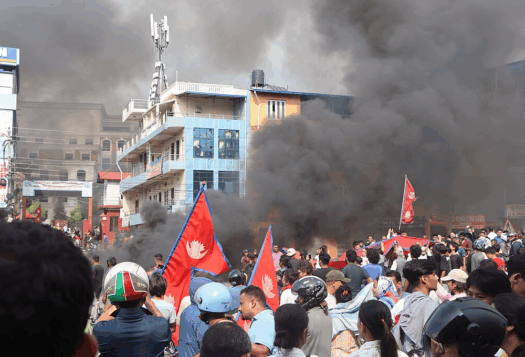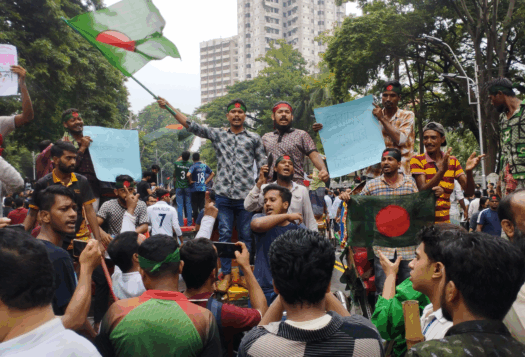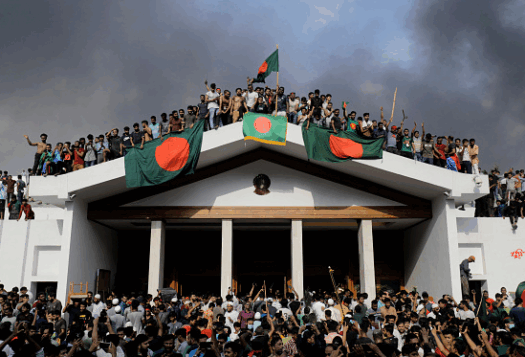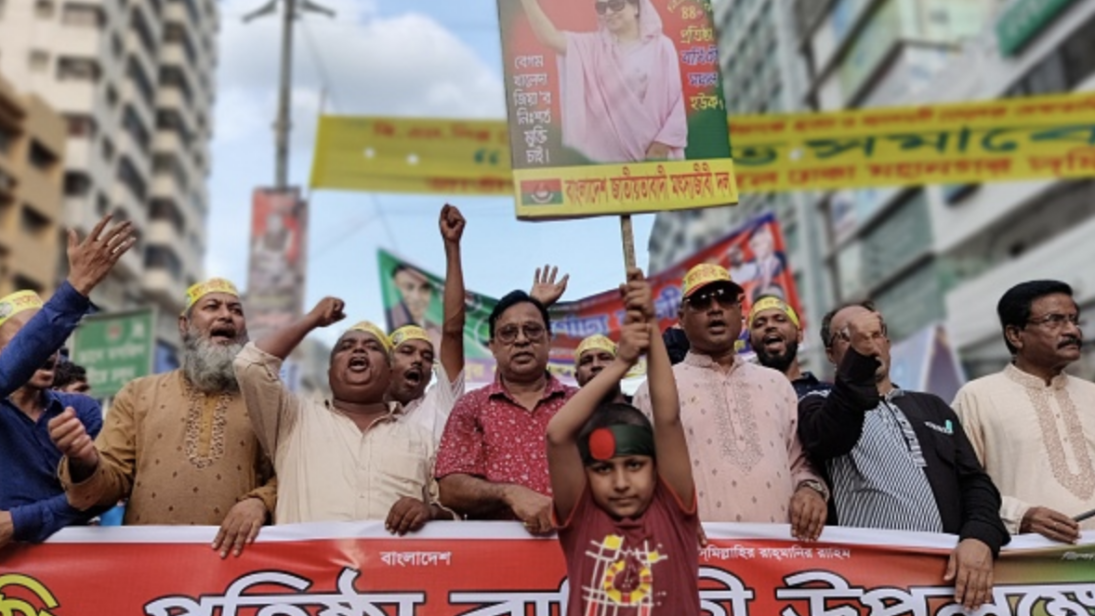
Since July 2022, Bangladeshi opposition parties, especially the Bangladesh Nationalist Party (BNP), have been holding rallies throughout the country. Though Bangladesh has experienced political volatility and regular general strikes in the past, the ruling Bangladesh Awami League (BAL) has held a monopoly on organizing political rallies and cracked down on public demonstrations by opposition parties in recent years. The presence of opposition on the street – with hundreds of thousands joining opposition rallies – marks a change in the country’s political scene. In response to the protests, the BAL has orchestrated transport strikes to deter citizens from joining the demonstrations, reportedly attacked rally attendees, and recently imposed restrictions on the flow of information.
What is behind this sudden intensification of these anti-government demonstrations, and what implications will it have on the country’s well-being? While Bangladesh’s growing economic crisis has contributed to the growing political discontent, the increase in public demonstrations reflects the increased anger about the BAL’s autocratic style of governance and fears about how it may handle the general elections scheduled for the end of 2023 or early 2024. The escalating face-off between the government and the opposition will likely lead to heightened violence in the coming months, further persecution of critics by the government, and the potential weakening of the ruling party’s grip over the situation. The worsening economic crisis may create a large pool of disgruntled citizens who will look for avenues to register their grievances, while the ruling party will try to keep the situation under its control by all means necessary.
Growing Economic Woes
Bangladesh is facing a swelling economic crisis, which has compounded political dissent. Recent demonstrations began after the government announced price hikes to the fuel and energy sectors in August, increasing overnight fuel prices by more than 50 percent. The unprecedented hike came on the heels of growing costs of essentials since the onset of the COVID-19 pandemic in March 2020. Despite repeated assurances from international organizations and local experts that the country is not in an economic crisis, the decline in foreign exchange reserves, a downward trend of remittances, and a trade deficit indicate hard times ahead. Inflation has reached its highest in decades. According to a World Bank report, Bangladesh has experienced the highest price hike of essentials among the five South Asian countries.
Though Bangladesh has experienced political volatility and regular general strikes in the past, the ruling Bangladesh Awami League (BAL) has held a monopoly on organizing political rallies and cracked down on public demonstrations by opposition parties in recent years.
Rolling blackouts have reached unprecedented levels, as government offices, banks, and even schools are now required to close more frequently and reduce hours to accommodate energy cuts. Power outages have increased after a national grid failure in early October, which left 80 percent of the country in the dark for hours. Fuel shortages render Bangladesh’s power plants inoperable, causing severe load-shedding disrupting industrial production, and contributing to price hikes of daily necessities and wage cuts. The government, on the one hand, is extending its deadline to resolve the situation, while on the other hand, claiming that there is no solution in sight. This proves that the BAL government has no intention of addressing the structural causes of this crisis: years of economic mismanagement, cronyism, and unsustainable infrastructure developments to gain performance legitimacy.
Bangladesh’s Human Rights Concerns
The growing protests challenge the BAL’s ostensible control over the administration and politics, which has been consolidated over the past decade. Elections in 2014 and 2018, described by international media and observers as highly rigged, delivered unprecedented victories to Sheikh Hasina, who now holds power for the third consecutive term since 2009. Human rights groups have documented the increasing incidences of human rights violations under her administration since 2009, such as extrajudicial killings and enforced disappearances. The outgoing Chief of the UN Human Rights Council, Michele Bachelet, raised concerns during her visit to Bangladesh in August 2022. The United States Treasury imposed sanctions on the elite police force called the Rapid Action Battalion (RAB) and seven of its current and former officers in December 2021. The Bangladesh government’s response to these concerns has consisted of harassing families of the victims, targeting families of expat critics, silencing human rights organizations, and rewarding alleged rights violators.
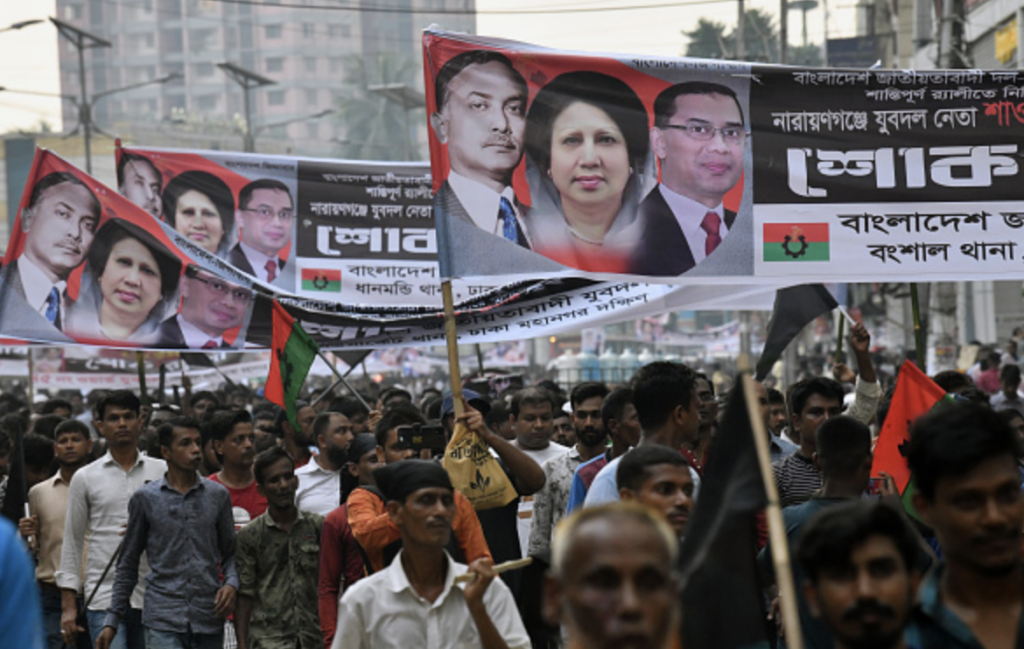
Since the beginning of these demonstrations, the government has intensified persecuting opposition activists and critics: for example, in July and August, offices and houses of opposition leaders were ransacked, several activists died, and thousands have been arrested. Nonetheless, the demonstrations have still gained strength, as reflected in the size of the recent gatherings.
The Bangladeshi government recently procured technology that will allow it to intercept encrypted messages in the popular messaging service called Telegram, adding to its existing sophisticated surveillance capacity. The government has also declared 29 government institutions as Critical Information Infrastructure (CII), and deemed access to these punishable offenses under the draconian Digital Security Act (DSA). The DSA, which came into effect in October 2018, has been used by the government and its supporters to suppress dissent. The government has accused at least 2,889 persons under the law until August 2022.
What’s Next: Looking Ahead to Elections
Concerns have emerged about what the next election will look like and the ability of Bangladeshi citizens to cast their votes freely. The actions of the Election Commission (EC), which is responsible for holding elections, have indicated that its capability to organize free and inclusive elections might be in question. Appointed in February 2022, the new Election Commission (EC) has yet to gain the trust of voters or opposition political parties. For instance, during elections in the northern district of Gaibandha on October 12, the EC halted voting due to “irregularities” after ruling party candidates captured almost all the polling stations. However, the EC didn’t take precautions to stop blatant rigging, failed to deter the ruling party supporters on the day of voting and the local administration didn’t act neutrally.
A fair and inclusive election in Bangladesh is unlikely unless the government makes reforms to ensure a level playing field.
The EC has decided to introduce Electronic Voting Machines (EVMs) in half of the 300 parliamentary constituencies after the Prime Minister suggested that EVMs will be fully available by the next election cycle. Although civil society organizations and a majority of opposition political parties have protested using EVMs, the EC paid little attention to their concerns. Worse yet, the EC doctored the opinion of the opposition parties to advance the use of EVMs in future elections. A staggering Taka 8,711 crore (approximately US$ 870 million) has been allocated to buy EVMs, which do not have a voter-verifiable paper audit trail (VVPAT) system.
Opposition parties have also insisted that they will not join the election under the government led by Sheikh Hasina, but the BAL is in no mood to accept the demand. Support for holding elections under a neutral government has grown among citizens after the 2018 election due to the suspected lack of impartiality of civil administration, the Election Commission (EC), and law enforcement agencies at the expense of ordinary Bangladeshis. The situation is no different this time around, as the police continue to act in favor of the BAL. The government’s recent decision to send a high-ranking civil servant and three police officials into “forced retirement” is indicative of a purge to keep both administration and police in line ahead of the election. A fair and inclusive election in Bangladesh is unlikely unless the government makes reforms to ensure a level playing field. Growing discontent with the economy and frustrations about authoritarian governance are pushing the citizens to the brink, while the incumbent government seems intent on confronting the opposition with force. Upholding the status quo means more crackdowns on the opposition and the suppression of dissenting voices in the coming months. However, opposition parties have remained fragmented and have yet to agree on a common course of action. All these trends point to a volatile future for Bangladeshi politics while economic woes increase and ordinary people continue to suffer.
***
